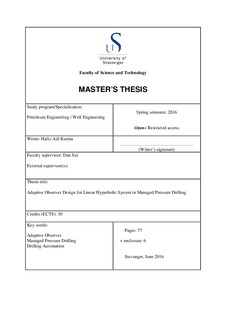Adaptive Observer Design for Linear Hyperbolic System in Managed Pressure Drilling
Master thesis
Permanent lenke
http://hdl.handle.net/11250/2587955Utgivelsesdato
2016-06Metadata
Vis full innførselSamlinger
Sammendrag
Managed Pressure Drilling (MPD) is a drilling technology that has been developed to manage and control the downhole pressure in the well in order to minimize drilling-related problems. This technology uses a pressurized closed-loop system and specialized equipment that allows better and more accurate pressure control of downhole pressure profile, therefore avoids drilling problems associated with downhole pressure variations, optimizes the drilling process by minimizing the non-productive time (NPT) and enables drilling prospects that are technically and/or economically un-drillable with conventional drilling methods.
An essential part of Managed Pressure Drilling operation is the control of the downhole pressure and it can be a challenging task due to the complex dynamics of wellbore hydraulics. In order to estimate the downhole pressure profile, a simplified hydraulic model has been recognized as a more convenient alternative than advanced hydraulic model since in the most cases, the available data contain insufficient information and several parameters are both uncertain and slowly changing that leads to higher level of complexity for the advanced hydraulic model.
By using simplified hydraulic model and available measurements, the pressure and flow dynamics of the well can be estimated. However, the downhole measurement is less reliable than the topside measurement because of slow sampling, and loss of communication for low or no-flow conditions, e.g., during pipe connection procedures. Depending just on the topside measurement, the downhole pressure needs to be accurately estimated despite the uncertainties in parameters such as friction, density, fluid loss etc.
This Master Thesis work describes an adaptive observer design to estimate the system states and the unknown parameter for the hydraulics of Managed Pressure Drilling using only one boundary measurement at the topside. Numerical simulations are performed to demonstrate the effectiveness of the adaptive observer. The results from simulations of drilling events such as drilling connection and lost circulation and also analysis from Lyapunov approach shows that the estimation error converges to zero, and the downhole pressure, the flow dynamics, the rate of lost circulation and other unknown parameters can be accurately estimated.
Beskrivelse
Master's thesis in Petroleum engineering
